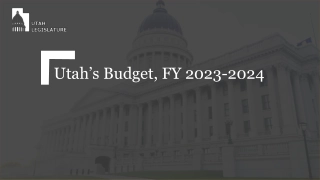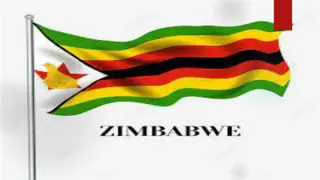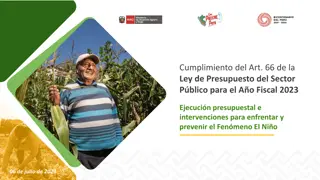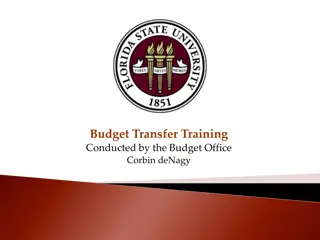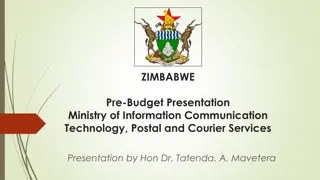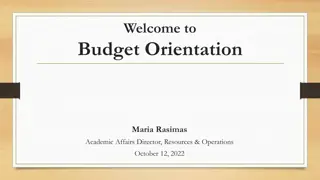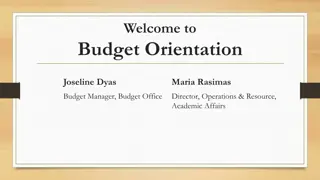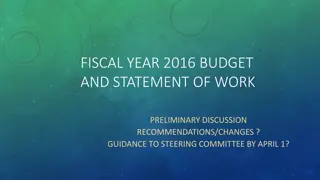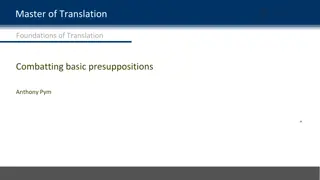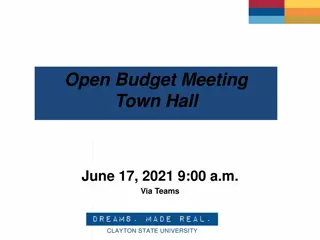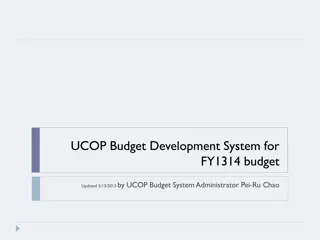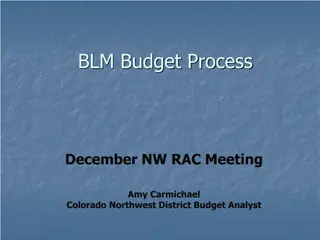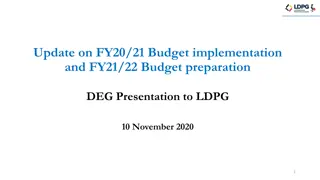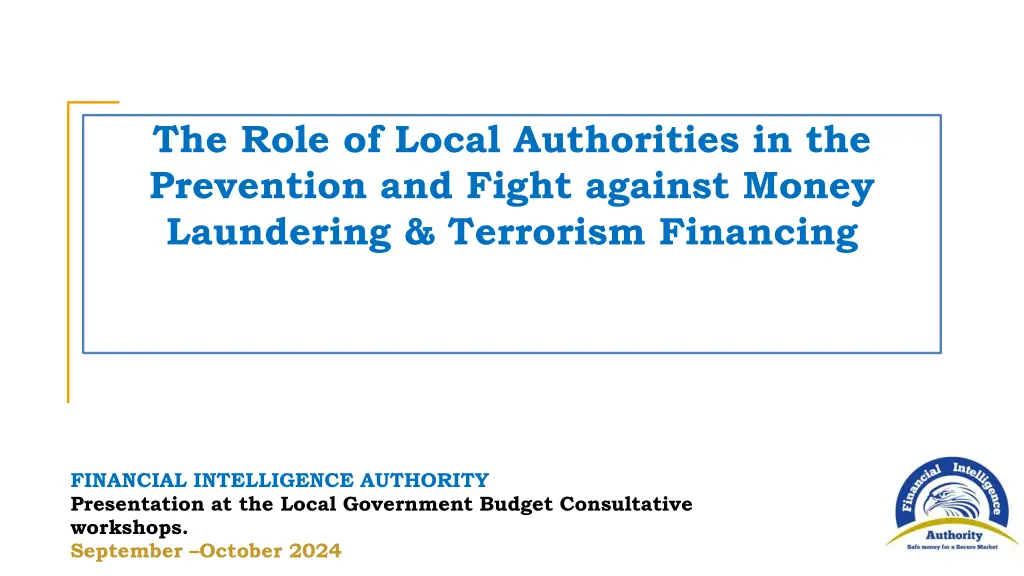
Understanding the Role of Local Authorities in Anti-Money Laundering and Terrorism Financing
Explore the crucial role of local authorities in combating money laundering and terrorism financing, as highlighted in the Financial Intelligence Authority's presentation. Learn about the functions of the FIA, the generation of financial intelligence, and the challenges faced in preventing terrorism financing in Uganda.
Download Presentation

Please find below an Image/Link to download the presentation.
The content on the website is provided AS IS for your information and personal use only. It may not be sold, licensed, or shared on other websites without obtaining consent from the author. If you encounter any issues during the download, it is possible that the publisher has removed the file from their server.
You are allowed to download the files provided on this website for personal or commercial use, subject to the condition that they are used lawfully. All files are the property of their respective owners.
The content on the website is provided AS IS for your information and personal use only. It may not be sold, licensed, or shared on other websites without obtaining consent from the author.
E N D
Presentation Transcript
The Role of Local Authorities in the Prevention and Fight against Money Laundering & Terrorism Financing FINANCIAL INTELLIGENCE AUTHORITY Presentation at the Local Government Budget Consultative workshops. September October 2024
Contents 1) Introduction 2) Money Laundering, Terrorist Financing 3) Role of LGs in the fight against ML/TF crime 4) Reporting Suspicious Transactions & Activities 5) Conclusion & Way Forward 2
Introduction- FIA Uganda Financial Intelligence Authority (FIA) is a gov t agency established under the Anti-Money Laundering Act (AMLA), 2013 to combat money laundering and terrorist financing in Uganda. FIA works with other LEAs to protect financial sector from being abused by criminals seeking to launder proceeds of crime or fund terrorist activities. FIA s mandate, places it at pivotal point between the reporting entities, supervisory bodies, law enforcement agencies and prosecutors. 3
FIAs mandate 1. Receive, analyze, and disseminate financial transaction information to LEAs. 2. Conduct ML/TF typology studies. 3. Monitor and give guidance to supervisory bodies & accountable persons. 4. Exchange information with similar bodies in other countries other FIUs 5. Conduct financial due diligence on all entities that intend to partner with Govt under the PP framework.
Generating Financial Intelligence Uganda just like other countries in the region has experienced an increasing trend of financial crime including corruption and other acquisitive crimes. Criminals are motivated by benefit/Proceeds in the form of assets and lifestyle improvement . The FIA gathers and generates financial intelligence to help in investigation and prosecution of ML/TF. 5
Terrorism Financing Uganda continues to face significant challenges from terrorism and terrorist financing, with several groups operating in the region and exploiting vulnerabilities in financial systems Terror groups continue to move funds, logistics taking advantage of the free movement of people, porous borders and financial systems Partnership through collaboration with local governments , local communities and the private sector to share information is important to curb TF
Accountable Persons Advocates Obligations To FIA 1. Registration with FIA NGOs, Churches Trust Companies All Licensing Authorities Casinos 2. Suspicious Transactions Reports Uganda Investment Authority Real Estate Agents 3. Large Transactions Reports. Cash and Monetary FIA Dealers in Precious Metals & Stones Registrars of Land 4. Cross Border declarations in case you travel with cash/BNI limits Trust & Company Service Providers Registrar of Companies Insurance Companies Financial Institutions Firms Licensed by the CMA 8
Know your Customer- Questions? 1. What is the Source of the Funds? 2. What is the Purpose/Use of the Funds? o All Accountable persons including Licensing authorities must interest themselves in the above questions .
Effects of Money Laundering & TF 1. Damages the integrity of the financial sector. Organized crime leads to infiltration of financial institutions, acquisition of large sectors of the economy, or bribery of public officials and governments. 2. Organized criminals can undermine the democratic system of the country by compromising the political, economic and social institutions. 3. Distorts economy by reducing tax revenue, causing unfair competition with legitimate business, and disrupting economic development 4. Country Reputational damage to regional and global AML/CFT bodies due to failure to meet obligations to which a country has committed itself FATF, FSRB (ESAAMLG), United Nations
11 Role of Local Authorities in the fight against ML/TF 1. KYC/Reporting . To commit certain crimes and launder money, criminals need certain businesses to clean the money they earn from crime. Such business include but not limited to; opening of bars or restaurants that require licenses that are issued by LGs. Before issuing this permit, LGs should collect necessary information from all partners to make an informed decision and rule out that this business will be used for criminal activities. This information should be kept for 10years. 2. Information Exchange. Local authorities have a lot of vital information that could provide early signs of organized crime and help prevent and detect it. 3. Collaboration with LEAs. LGs can share information collected with LEAs at licensing and be good partners in identifying emerging ML risks and crime .This could be shared with FIA via whistleblowing.
12 Leading Proceeds Generating Crimes in Uganda Uganda conducted ML/TF NRA, which is an evaluation of the level and nature of money laundering and terrorist financing (ML/TF) risks that a country faces. The report indicated that Most prominent proceeds generating crimes are; Domestically: corruption, fraud (cybercrime, obtaining money by false pretences, and pyramid schemes), tax crimes, and counterfeiting of goods. Externally (committed outside of Uganda and the proceeds laundered in or through Uganda): drug trafficking, human trafficking, smuggling, wildlife offences and tax evasion. These crimes happen in our communities, we all have a duty to report.
Why Criminals Launder Money? The Predicate Offences and money Laundering (ML) share an inseparable relationship. ML serves as the mechanism through which the proceeds of predicate offences are concealed, transformed, and integrated into the legitimate financial system. Criminals engage in money laundering to obscure the illicit origins of their funds, making them appear legitimate and avoiding suspicion. Understanding the link between predicate offences and ML is essential for authorities to disrupt and dismantle criminal networks and ultimately help to keep our communities safe .
Reporting Suspicious Transactions/Activities Reporting of Suspicious Activities If individuals come across transactions or activities that raise suspicion, it is important to report them to the relevant authorities and subsequently to the FIA. FIA has developed a public reporting portal or the whistleblowing site https://wb.fia.go.ug/ that is very anonymous. Prompt reporting by the public and accountable persons can contribute to the timely detection and prevention of criminal activities
Conclusion The fight against ML/TF is an enormous challenge that cannot be won by one person or Organization but rather - it needs concerted effort. Local Government and other partners can and should also play a role in fighting organized crime and money laundering in the most efficient way. When these partners are not or only insufficiently involved, it is easier for criminals and criminal organisations to launder the money or finance terrorism with the money earned from criminal activities. We ask all of you to be our Ambassadors in the AML/CFT fight
Thank you 16

